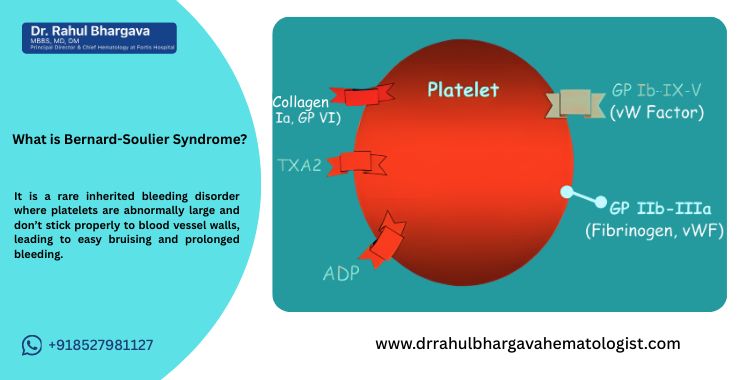Bernard-Soulier Syndrome Treatment in India

Bernard-Soulier Syndrome (BSS) is a rare genetic bleeding disorder that affects the platelets' ability to function properly. It is caused by defects in the platelet surface receptors, leading to an impaired ability of platelets to adhere to blood vessel walls and form a clot in response to injury. This results in bleeding complications that can range from mild to severe, often presenting in infancy or early childhood.
BSS is autosomal recessive, meaning that an individual must inherit two copies of the defective gene (one from each parent) to develop the condition. It is most commonly diagnosed through a combination of laboratory tests and clinical evaluation.
What is Bernard-Soulier Syndrome?
Bernard-Soulier Syndrome (BSS) is a rare genetic blood disorder that affects platelet function. Platelets are cells responsible for blood clotting, and in BSS, these platelets are abnormally large and fewer in number. This condition often leads to excessive bruising, prolonged bleeding after injury, and sometimes spontaneous bleeding. The syndrome is inherited in an autosomal recessive pattern, meaning both parents must carry the defective gene for a child to be affected.
Causes of Bernard-Soulier Syndrome
The primary cause of Bernard-Soulier Syndrome is a mutation in the genes that control glycoproteins in platelets, specifically the GP1BA, GP1BB, or GP9 genes. These glycoproteins play a vital role in platelet adhesion, which is crucial for clot formation. Without normal functioning of these glycoproteins, the platelets cannot properly adhere to the blood vessel walls, resulting in bleeding issues.
Types of Bernard-Soulier Syndrome
Bernard-Soulier Syndrome can be classified based on the type of genetic mutation:
- Classic Bernard-Soulier Syndrome: Characterized by large platelets and a significant reduction in platelet count.
- Variant Forms: Includes cases where specific glycoproteins are affected differently, leading to variations in severity and symptoms.
Symptoms of Bernard-Soulier Syndrome
The symptoms of Bernard-Soulier Syndrome often manifest early in life, typically during childhood. Common symptoms include:
- Easy bruising
- Excessive bleeding after cuts or surgeries
- Frequent nosebleeds
- Heavy menstrual periods in women
- Bleeding gums
- Petechiae (tiny red or purple spots caused by bleeding under the skin)
In severe cases, individuals may experience spontaneous bleeding without any obvious cause.
Diagnosis of Bernard-Soulier Syndrome
Diagnosing Bernard-Soulier Syndrome involves a combination of clinical examination, family history, and specialized blood tests. Dr. Rahul Bhargava recommends the following diagnostic approaches:
- Complete Blood Count (CBC): To check for low platelet counts and large platelets.
- Platelet Aggregation Tests: To assess the functionality of platelets.
- Flow Cytometry: A technique used to analyze the glycoproteins on the surface of platelets.
- Genetic Testing: To confirm mutations in the GP1BA, GP1BB, or GP9 genes.
Early and accurate diagnosis is crucial for managing the symptoms and preventing complications.
Treatment of Bernard-Soulier Syndrome
While there is no definitive cure for Bernard-Soulier Syndrome, the treatment focuses on managing symptoms and preventing excessive bleeding. Dr. Rahul Bhargava recommends the following treatment strategies:
- Platelet Transfusions: In severe cases of bleeding or during surgery, platelet transfusions can be administered to replenish the platelet count.
- Antifibrinolytic Agents: Medications like tranexamic acid help reduce bleeding, especially during dental procedures or surgeries.
- Avoidance of Certain Medications: Patients with BSS should avoid aspirin and nonsteroidal anti-inflammatory drugs (NSAIDs), as these can worsen bleeding.
- Iron Supplements: In cases of chronic bleeding, iron supplementation may be required to prevent anemia.
Cost of Treatment and Stay in India
The cost of treating Bernard-Soulier Syndrome in India is relatively affordable compared to many Western countries, making it an attractive destination for medical care. The treatment plan typically focuses on symptom management, including platelet transfusions, antifibrinolytic therapy, and supportive care. Here’s an overview of the costs:
-
Initial Consultation:
USD: $30 – $100
INR: ₹2,200 – ₹7,400 -
Blood Tests (CBC, Platelet Aggregation Tests, Genetic Testing, etc.):
USD: $50 – $200
INR: ₹3,700 – ₹14,800 -
Platelet Transfusions:
USD: $100 – $300 per transfusion
INR: ₹7,400 – ₹22,200 per transfusion -
Antifibrinolytic Agents (per month):
USD: $30 – $100
INR: ₹2,200 – ₹7,400 -
Iron Supplements (per month):
USD: $10 – $50
INR: ₹750 – ₹3,700 -
Hospital Stay (per night):
USD: $25 – $200
INR: ₹2,000 – ₹15,000 per night
India’s healthcare system provides high-quality care at a fraction of the cost compared to many other countries, making it a cost-effective option for those managing Bernard-Soulier Syndrome. The costs can vary based on the severity of the condition and the healthcare facility, but overall, patients benefit from accessible and affordable treatment options.
Frequently Asked Questions
No, Bernard-Soulier Syndrome is not curable, but symptoms can be managed effectively through treatments like platelet transfusions and antifibrinolytic medications.
Yes, BSS is inherited in an autosomal recessive pattern, so both parents must carry the defective gene for a child to inherit the condition.
With proper management and medical care, most patients with BSS can lead relatively normal lives, though they must take precautions to avoid injuries and manage bleeding.